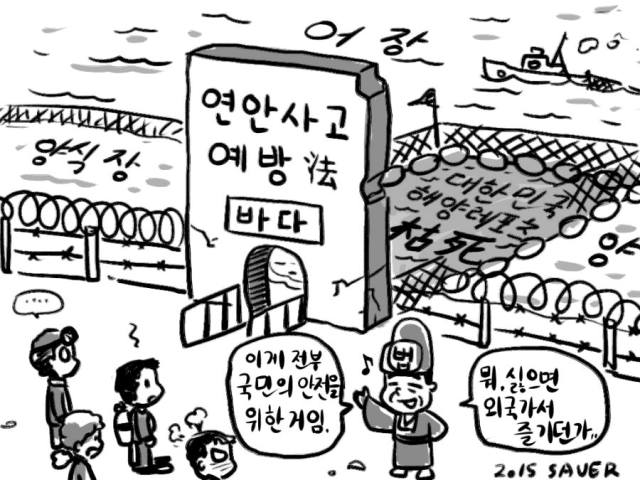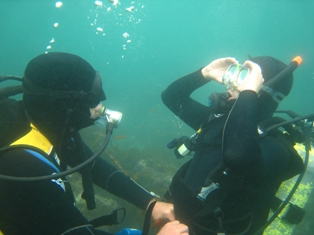| |
 |
|
| ▲ The restricted entrance to the beach says “Accident Prevention” while a guard explains the law has been made for citizen safety. “If you don’t like it you can go abroad,” he adds. Image courtesy Saver |
Do you want to dive or get certified as a diver here on Jeju? Well move fast, as the Ministry of Public Safety and Security’s new “Seaside Accident Prevention” law, in effect from June 1, is likely to sink the industry, warn dive shops.
Key points of the law
• Dive shops must apply for diving permits 14 days in advance of dives;
• Divers must pay 12.000 won insurance per day
• If diving from a boat, one ‘safety boat’ per diver must be present at the dive site.
As soon as news of the law got out mid-April, a joint communiqué — signed by international diving brands Mares, Interocean, global diving agencies CMAS, BSAC, SSI, non-profit diving clubs and dive magazine owners — was sent to all 700 dive businesses in South Korea to inform of the law and mobilize support against it.
Why is the law opposed?
Not only do many within the industry refute that dive safety regulations are needed, there is also a strong belief that the law’s excessive regulation will actually undermine dive safety.
Korean Coast Guard statistics which show that over a three-year period, from 2011 to 2013, there were an alarming 9,984 seaside fatalities, but only 18 of these were divers. Most of the remaining 9,966 were drowned beachgoers and fishermen falling off of rocks into the water.
They also point out that the 18 diving fatalities weren’t all recreational divers. Among the 18 were divers fishing illegally and commercial divers, areas which have no connection to recreational diving and the proposed regulations.
The statistics suggest that swimming on beaches and fishing from rocks are much more dangerous than scuba diving.
| |
 |
|
| ▲ Dive instructor Ralf Deutsch (left) teaches an entry-level student basic skills for safe diving. Photo courtesy Jeong Hong Yeol |
Dive shops aghast at changes
News of the law came as a blow to Ralf Deutsch, owner of Seogwipo dive shop, Big Blue 33.
“This law will destroy the dive industry in Korea. How can a dive shop make a living if we can only take divers out who have been registered for the dives 14 days before? It’s unworkable.”
Pointing out the impracticality of rearranging dives, Deutsch wonders whether authorities can guarantee weather conditions for the days on which permits have been granted.
“Can I apply for a new permit for the following day? No I can’t, because the authorities demand 14 day’s notice! It’s totally unrealistic!”
Jeong Hong Yeol, a dive instructor and scuba-club leader in Seoul, concurs.
“Eighty to ninety percent of my customers never book in advance. They just turn up at the dive shop asking to go diving on that day or the following. This policy is incompatible with the realities of running a dive business.”
Although Deutsch understands how the obligatory insurance might give divers peace of mind, he doubts it would improve safety, and denounces the 12,000 won per day as “outrageous” considering market rates.
“DAN Europe offers dive insurance with worldwide coverage including medical evacuation for 59 Euros [70.000 won] per year! It’s a fraction of the price this law is proposing. It’s a total rip-off!”
Deutsch also questions the logic of having one “safety boat” per diver present on site during boat dives.
“This is complete nonsense! If there are more boats at a dive site, there are more propellers over the divers underwater and so the likelihood of them getting hit by a propeller is considerably higher.”
Bleak future
The whole situation has left Deutsch pessimistic about the future. He warns that “costs will go up horrendously” as the 14-day advanced permit requirement slows business and divers have to foot the bill for the obligatory insurance and extra safety boats.
“Korea will be made the most expensive diving destination in the world and divers will flock to South East Asia where it’s cheaper.”
Kim San Gil owner of Good Diver, a Seogwipo dive shop, shares Ralf’s pessimism. “As long as politicians and government people don't change their ideas ... the future for diving in Korea is dark.”
Sound advice
| |
 |
|
| ▲ Dive safety training. Photo courtesy James Barker |
In terms of how to resolve the situation, Deutsch would like to see a round-table discussion on improving dive safety with Korea’s leading dive representatives.
Possible measures include emergency oxygen at dive sites, propeller cages on dive boats and local recompression chambers.
“None of these issues are mentioned in this new law. It confirms my suspicions that not one dive training agency or dive instructor has been consulted.
Deutsch believes opposition to the law is so strong that it will be some time before it can be implemented. He says safety begins with diver education and he would welcome local dive pools to improve safety training.
“Safety in general comes from safe behavior and this can be learned through education but not through the law.”
Ministry of Public Safety and Security response
The Ministry states that the new law intends not to regulate personal and club activities, but ensures managers observe minimum safety standards to prevent accidents.
It recognizes that some parts of the law might not reflect the reality of diving, and therefore it is seeking the opinions of private organizations and professionals to improve safety and develop the ocean leisure industry.
The Ministry adds that emergency rescue ships must be able to accommodate all participants as well as the non-motorized craft, stressing that ships already transporting divers to dive sites can fulfill this role.
Supporting the campaign
Sign the Facebook petition to oppose the new law here: facebook.com/divingforfree. Each “Like” serves as a signatory to the petition. The goal is 5,000 likes.
Deutsch also suggests Korean residents lodge a complaint at: epeople.go.kr (English available). Petitions can be uploaded to the website and then sent to the appropriate ministry.
|






















